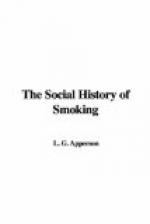Mrs. Alice Morse Earle, in her interesting book, abounding in curious information, on “The Sabbath in Puritan New England,” says that the use of tobacco “was absolutely forbidden under any circumstances on the Sabbath within two miles of the meeting-house, which (since at that date all the houses were clustered round the church-green) was equivalent to not smoking it at all on the Lord’s Day, if the law were obeyed. But wicked backsliders existed, poor slaves of habit, who were in Duxbury fixed 10s. for each offence, and in Portsmouth, not only were fined, but to their shame be it told, set as jail-birds in the Portsmouth cage. In Sandwich and in Boston the fine for ’drinking tobacco in the meeting-house’ was 5s. for each drink, which I take to mean chewing tobacco rather than smoking it; many men were fined for thus drinking, and solacing the weary hours, though doubtless they were as sly and kept themselves as unobserved as possible. Four Yarmouth men—old sea-dogs, perhaps, who loved their pipe—were in 1687 fined 4s. each for smoking tobacco around the end of the meeting-house. Silly, ostrich-brained Yarmouth men! to fancy to escape detection by hiding around the corner of the church; and to think that the tithing-man had no nose when he was so Argus-eyed.”
On weekdays many New England Puritans probably smoked as their friends in old England did. A contemporary painting of a group of Puritan divines over the mantelpiece of Parson Lowell, of Newbury, shows them well provided with punch-bowl and drinking-cups, tobacco and pipes. One parson, the Rev. Mr. Bradstreet, of the First Church of Charlestown, was very unconventional in his attire. He seldom wore a coat, “but generally appeared in a plaid gown, and was always seen with a pipe in his mouth.” John Eliot, the noble preacher and missionary to the Indians, warmly denounced both the wearing of wigs and the smoking of tobacco. But his denunciations were ineffectual in both matters—heads continued to be adorned with curls of foreign growth, and pipe-smoke continued to ascend.
In this country tobacco is said to have invaded even the House of Commons itself. Mr. J.H. Burn, in his “Descriptive Catalogue of London Tokens,” writes: “About the middle of the seventeenth century it was ordered: That no member of the House do presume to smoke tobacco in the gallery or at the table of the House sitting as Committees.” I do not know what the authority for this order may be, but there is no doubt that smoking was practised in the precincts of the House. In “Mercurius Pragmaticus,” December 19-26, 1648, the writer says on December 20, speaking of the excluded members: “Col. Pride standing sentinell at the door, denyed entrance, and caused them to retreat into the Lobby where they used to drink ale and tobacco.”




